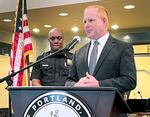Portland Police Chief Chuck Lovell is resigning from his post as the city’s top law enforcement officer, but he plans to continue working for the police bureau.
Lovell and Mayor Ted Wheeler made the announcement on Wednesday at City Hall. The news was first reported by The Oregonian/OregonLive.
Lovell led the bureau for three years. He will stay on with the city as a community engagement leader.
The announcement is the latest out of a City Hall that is very much in transition as politicians, bureau leaders and city employees prepare for the new world in 2025 with a dramatically larger City Council and a city administrator leading the government.

Police Chief Chuck Lovell at a press conference Aug. 30, 2020, in Portland, Ore. A man was shot and killed the previous night as a Trump car caravan rolled through downtown.
Bradley W. Parks / OPB
Lovell will leave as Wheeler’s longest-serving chief. In his remarks at City Hall, Lovell said he was appointed to the job “essentially overnight” by former Chief Jami Resch in June 2020 amid the national and local protests over racial justice in the wake of George Floyd’s murder. Resch took over when Danielle Outlaw left to lead Philadelphia’s police force after just over two years in 2019.
Lovell said the past three years have been challenging. “I always knew that I wasn’t going to do it [be chief] for the seven years remaining in my career,” Lovell said of his eventual retirement. “I just felt like it was time.” Lovell’s last day as chief is Oct. 11.
Robert Day, a longtime leader in the bureau who retired in 2019, was appointed interim chief. Wheeler is not running for reelection in 2024; the next mayor will select a permanent leader.
Day gave a passionate speech about why he’s returning to the city, where he spent 29 years working in law enforcement. He flatly stated he would not accept a permanent post by the next mayor and talked several times about his improving golf game in his short-lived retirement. He took the call from Wheeler to return because he’s passionate about Portland.
“I’m hopeful for this city,” Day said, “I see the challenges. I’m not naïve.”
Portland has experienced a record number of homicides and traffic fatalities during the past few years, and Lovell struggled to fill vacancies at the department. His tenure overlapped with the COVID-19 pandemic, historic racial justice protests and the city’s rising homelessness crisis.
Day pledged to take a “holistic approach” to addressing safety concerns in Portland - speaking about safety as an innate human desire that is held by everyone. He cited numerous books during his comments and quoted writer and thinker James Baldwin in his remarks, saying that no challenge in life can be changed until it is faced.
“I don’t know if we’re going to be able to change them,” he said of Portland’s many challenges, but he asked residents to be hopeful.

Robert Day, a longtime leader in the Portland Police Bureau who retired in 2019, speaks at a press conference at Portland City Hall on Sept. 20, 2023. Chuck Lovell, left, announced he is resigning from the leadership position for the past three years. Day will take over as interim police chief.
Alex Zielinski / OPB
Day said that he’s worked for 12 or 13 different chiefs during his decades-long career, all of whom said they wanted to restore trust in the community. He described trust as “foundational” to the work. He said that safety concerns in a city typically fall to police, but he said safety is “far bigger than police,” citing the importance of safety to environmental concerns or to people living unsheltered. “I absolutely see and understand the role of policing in the public safety conversation but I see this as a system,” he said.
Lovell said he will continue to work closely with Day, with whom he’s worked closely at various points and in different assignments since Lovell joined the bureau in 2002. Lovell rose through the ranks from school resource officer until being named captain immediately before being tapped as chief.
Day worked in numerous roles across the bureau, serving as Outlaw’s deputy chief and as the head of the training division.
Lovell said that Day’s extensive working experience in downtown in particular should help enhance the bureau’s efforts to address safety issues there.
He added that he was proud of “many good things” that happened during his three years, including the city finally adopting body-worn cameras for officers, which Lovell called “huge for the bureau and the community.”
Wheeler, who The Oregonian/OregonLive reported this week plans to take control over city bureaus during the next 15 months as the city moves toward its new form of government, said there are no current plans to change leaders at other city agencies.
“This is a very specific circumstance,” he said, while adding that he would be “surprised” if no agency or bureau leader left their post in the next 15 months.
Wheeler said it was important to him that he appoint an interim leader, not a permanent chief, saying that duty should belong to the next mayor.



